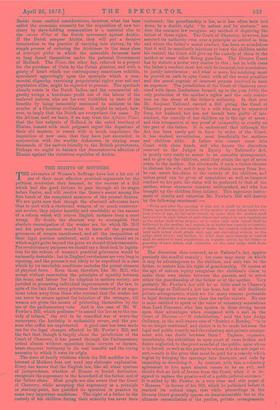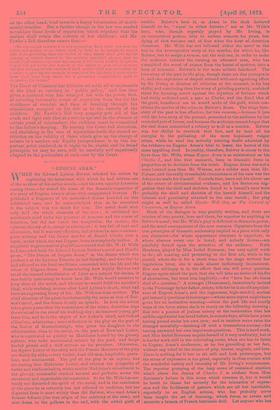THE RIGHTS OF MOTHERS.
THE advocates of Women's Suffrage have lost a bit out of one of their most effective practical arguments for the political revolution they demand, by the success of a Bill which had the good fortune to pass through all its stages before Easter, and will receive the Queen's assent among the first batch of the completed measures of the present Session. We are quite sure that though the aforesaid advocates have thus to part with a rhetorical weapon of so much controver- sial service, they rejoice heartily and unselfishly at the success of a reform which will relieve English mothers from a cruel wrong. No doubt, the shortest way to accomplish that absolute emancipation of the weaker sex for which Mr. Mill and his party contend would be to leave all the practical grievances of women unredressed, and all the inequalities of their legal position unaltered, until a reaction should set in which might go far beyond the point we should think reasonable. For revolutionary purposes we should say a dead-lock in legisla- tion for the redress of women's practical grievances would be eminently desirable ; but in England revolutions are very long in ripening, and the process is not likely to be expedited in a case which by its inevitable conditions excludes the potent element of physical force. Even those, therefore, like Mr. Mill, who accept without reservation the principles of equality between the sexes, and labour for its adoption in modern society, are justified in promoting individual improvements of the law, in spite of the fact that every grievance thus removed is an argu- ment taken away from those who contend that the weaker sex can never be secure against the injustice of the stronger, till women are given the means of protecting themselves by the use of the parliamentary vote. And in the case of Mr. W. Fowler's Bill, which professes "to amend the law as to the cus- tody of infants," the evil to be remedied was of every-day occurrence, the hardship is undeniably severe, and the per- sons who suffer are unprotected. A good case has been made out for the legal changes effected by Mr. Fowler's Bill, and the fact that though it largely alters the jurisdiction of the Court of Chancery, it has passed through the Parliamentary ordeal almost without opposition from lawyers or laymen, bears eloquent testimony to its real benefits and the crying necessity to which it owes its origin.
The state of family relations which the Bill modifies in the interest of Mothers does not need any elaborate explanation.
Every one knows that the English law, like all other systems of jurisprudence whether of Roman or feudal derivation recognises the supremacy in the household of the father, and of the father alone. Most people are also aware that the Court of Chancery, while accepting this supremacy as a principle or starting-point, has qualified its operation in practice by some very important conditions. The right of a father to the custody of his children during their minority has never been contested ; the guardianship is his, as it has often been laid down, by a double right, "by nature and by nurture," nor does the common law recognise any method of depriving the father of these rights. The Court of Chancery, however, has asserted its authority even over a principle so settled as this, and where the father's moral conduct has been so scandalous that it will be manifestly injurious to leave the children under his control, the Court will give up the custody of them to the mother or some other fitting guardian. The Divorce Court has by statute a power very similar to this ; but in both cases the father's conduct must not only be immoral, but scandalous, to justify interference ; and what is more, his misdoing must be proved on oath in open Court, with all the social penalties and the moral anguish of innocent persons involved in such an exposure. The jurisdiction of the Court of Chancery exer- cised with these limitations formed, up to the year 1839, the only protection of the mother's rights and the only restric- tion on the abuse of the father's authority. In that year Mr. Serjeant Talfourd carried a Bill giving the Court of Chancery power to concede to a wife who may be separated from her husband, but has not herself been guilty of mis- conduct, the custody of her children up to the age of seven ; and this irrespective of any proof of immorality or cruelty on the part of the father. It is understood that although the Act has been rarely put in force by order of the Court, it has worked, nevertheless, most beneficially for mothers and children alike. A father who cannot come into Court with clean hands, and who knows the discretion reserved to the Judges in Equity by Talfourd's Act, is mostly very ready to assent to an amicable arrangement, and to give up the children, until they attain the age of seven years, to the mother. But afterwards, if such a father chooses to distress his wife, and it may be to obtain money from her, he can assert his claim to the custody of his children, and unless proof can be given of scandalous as well as immoral conduct on his part, his claim will be preferred to that of the mother, whose character remains unblemished, and who has brought up the children from infancy. This ingenious instru- ment of cruelty and extortion Mr. Fowler's Bill will destroy by the following enactment :—
"From and after the passing of this Act it shall be lawful for the Court, upon hearing the petition of the mother of any infant under six- teen years of age, by her next friend, to order that the mother shall have access to such infant at such times and subject to such regulations as the judge shall deem proper ; or to order that such infant shall be delivered to the mother, and remain in or under her custody or control; or shall, if already in her custody or under her control, remain therein until such infant shall attain such age, not exceeding sixteen, as the judge shall direct; and further, to order that such custody or control shall be subject to such regulations as regards access by the father or guardian of such infant, and otherwise, as the said judge shall deem proper."
The discretion thus reserved, as in Talfourd's Act, applies precisely the needful remedy ; for cases may occur in which it may be advantageous to the children, and only fair to the father, to restore him his right of guardianship. Of course at the age of sixteen equity recognises the children's claim to make their own choice between the parents, and to select either the guardianship of the father or of the mother. Very probably Mr. Fowler's Act will be as little used in Chancery proceedings as Talfourd's Act has been, but it will facilitate private arrangements, which are for many reasons preferable to legal decisions even more than the earlier statute. No one is more entitled to speak of the value of voluntary separations than Lord Penzance, who has spoken in these strong terms upon their advantages when compared with a suit in the Court of Divorce :—" If cohabitation," said the late Judge Ordinary, in the well-known case of "Rowley v. Rowley," "is to be no longer continued, and choice is to be made between the legal and public remedy and the voluntary and private arrange- ment, who can doubt between them ? Expense, exposure, uncertainty, the exhibition in open court of vows broken and duties neglected, to the great scandal of the public, upon whom it is forced, as well as the parties to whom it is the sole legal re- sort,—such is the price that must be paid for a remedy which begins by bringing the marriage into disrepute, and ends by impairing or dissolving it. In contrast with this, a voluntary agreement to live apart almost ceases to be an evil, and should find no lack of favour from the Court, when it is de- signed to replace the greater evil of a public judicial sentence." It is added by Mr. Fowler, in a very clear and able paper of " Reasons " in favour of his Bill, which he published before it reached its critical stage, that while proceedings in the Divorce Court generally oppose an insurmountable bar to the ultimate reconciliation of the parties, private arrangements, on the other hand, tend towards a happy termination of matri- monial troubles. But a further change in the law was needed to validate those deeds of separation which stipulate that the mother shall retain the custody of her children ; and Mr. Fowler's Bill therefore enacts that,—
"No agreement contained in any separation deed made between the father and mother of an infant shall be held to be invalid by reason only of its providing that the father of such infant shall give up the custody or control thereof to the mother; provided always, that no Court shall enforce any such agreement, if the Court shall be of opinion that it will not be for the benefit of the infant to give effect thereto; and that nothing herein contained shall render valid any agreement by a father to give up the custody or control of his children, if such agree- ment shall have been made for a pecuniary consideration paid or se:nred to the father."
The Court of Chancery has hitherto set aside all arrangements of the kind as contrary to " public policy," and has thus given a husband who has wronged his wife the power, first, of extorting favourable terms of separation from her for the avoidance of scandal, and then of breaking through the stipulations accepted on his side as to the custody of the children. Mr. Fowler's Bill very properly gets rid of the crude and rigid rule that at a certain age and in the absence of certain proof of misconduct, the children must be committed to the father's keeping. By leaving the Court full discretion and abolishing in the case of separation-deeds the absurd re- striction on the validity of those which give up the charge of infants to a mother, our Equity jurisprudence is in this im- portant point rendered, as it ought to be, elastic, and its broad principles, we may be sure, will be carefully and sagaciously adapted to the particulars of each case by the Court.



































 Previous page
Previous page